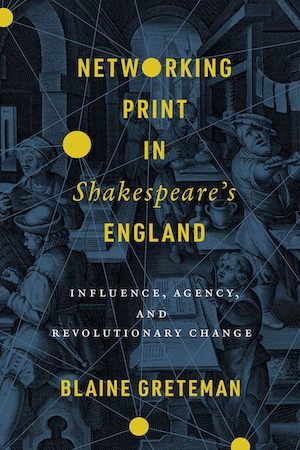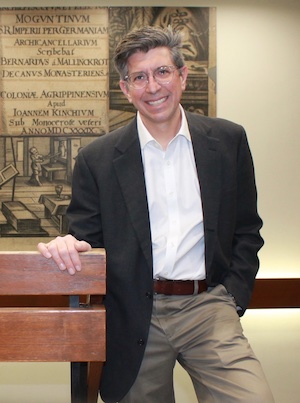By Nathan Kouri
In A Room of One’s Own, Virginia Woolf imagines what would’ve happened if Shakespeare had a sister who was a brilliant writer. Woolf shows point by point how a woman at the time would have been barred from all the privileges that paved the way to a successful literary career like Shakespeare’s, from education and employment to independence and free time, while also facing legal restrictions and gendered violence. Well, what if Shakespeare had a friend married to a brilliant writer who published more than 60 books? What would have happened to her? With her exceptional ambition and opportunity, would history be any kinder?
This isn’t a hypothetical, as we find out in Networking Print in Shakespeare’s England by Blaine Greteman (ΦBK, Oklahoma State University). The description fits a flamboyant, self-styled prophet named Eleanor Davies, one of the historical figures unearthed in the forthcoming book. Davies was dismissed as insane by her contemporaries and has rarely been written about since, despite being a well-known and prolific author in her time.

Since most histories of the period ignore Davies, how did Greteman rediscover her importance? Network science. In collaboration with other researchers, he translated the Renaissance publishing world into a network map, then analyzed this massive network with a computer program. The results were surprising. Davies’ significance was revealed mathematically, thanks to her high degree of “betweenness centrality.” In other words, she might not have been the most connected person in the network, but the connections she did have were among the most crucial, particularly in cases where she was the only person linking together separate groups.
Eleanor Davies wasn’t the only missing link. Greteman discovered that many important characters in Renaissance publishing “are almost completely absent from the historical record. They don’t have entries in the Oxford Dictionary of National Biography. They’re not people who are household names in literary history or other kinds of histories. [Network analysis] allows us to discover people who are important but who we’ve ignored,” he said. The project was a considerable undertaking. Researchers refined catalog entries of nearly half a million books, turned them into a database, and converted that database into a network of around fifty thousand people. Curious readers can explore the network online at Shakeosphere.
While some might be surprised by the combination of literature and computer science, Greteman sees it as a natural fit. “One of the projects of the book is to remind people . . . that the computing sciences and the humanities are mutually enhanced when they inform one another,” he said. “Using digital analysis to rethink the way we do literary history is both exciting and well-grounded in what literary history has always been about. Poems are also instruments to change the way you see things.”
Renaissance authors were particularly fascinated with science and new technologies, Greteman explained. “When the poets that I study talked about perspectives, they were talking about telescopes: a perspective glass. They were super excited by the idea that there’s this mechanical technology that can change the way you see something . . . . This is the reason why the poet John Milton makes a pilgrimage to see Galileo, this person who’s demonstrated that you can use a machine to totally resituate your understanding of the truths of the world.”
In many ways, Greteman’s methodology does just that, in creating a new way of looking at literary history. In his version of events, it’s no longer a handful of major authors, a dozen or so minor ones, and a bunch of profiteers and also-rans. Instead, it’s a rich, cross-pollinated society of overlapping groups and institutions, in which the smallest pieces are essential to the network as a whole. “When you think about revolutionary ideas, they’re often not new ideas,” Greteman said. “The actual revolutionary moment is when they get connected up with a place or a person that hasn’t encountered them before. Books can be that thing.”
Networking Print in Shakespeare’s England will be forthcoming this August from Stanford University Press. Though the book is focused on the past, it couldn’t be more timely. Between social media and Covid pods, we’re already inclined to view our lives in terms of social networks. Watching a pandemic spread in real-time has made us all painfully aware of “the strength of weak ties.” That is, the outsized impact acquaintances and other distant relationships have on our lives.
That’s something, it turns out, we have in common with Renaissance England. “A lot of the figures in this moment intuitively talk about books in network terms. They talk about how these ideas or these books are spreading like a wildfire or like an infection,” Greteman explained. “While they didn’t have the concept of networks, they had a lot of experience seeing how plagues spread through a society . . . . Very early on, as they grapple with the way print is changing, and sometimes threatening, the old order, they use the terms of infections and plagues and pestilences. They were already seeing exactly the thing you’re able to track with a project like this, which is that books are network technologies and information moves through a society in predictable, networked ways.”
Greteman is currently an associate professor of English at the University of Iowa. When he was an undergrad at Oklahoma State University, they didn’t have a Phi Beta Kappa chapter. Nor had the school ever produced a Rhodes scholar—until Greteman became their first. “Having a Rhodes scholarship, evidently, was one of the things that helped Oklahoma State make the case that they should have a Phi Beta Kappa chapter. When they got one several years later, I was retroactively inducted” he said. “It was exciting for me partly because it was exciting for the people who had helped me get the Rhodes scholarship in the first place . . . . For a lot of people who devoted their lives to [the University] and to making it an institution of excellence, it felt like . . . a recognition of the work that they had done at OSU. I really was pleased to be a part of that.”
Nathan Kouri earned his bachelor’s degree in English and cinema from the University of Iowa, where he was inducted into Phi Beta Kappa in 2019. The University of Iowa is home to the Alpha of Iowa chapter of Phi Beta Kappa.




